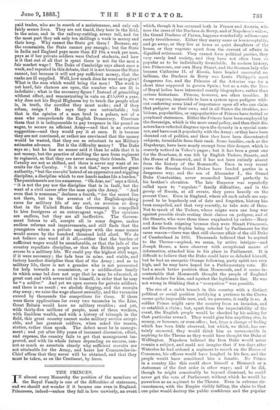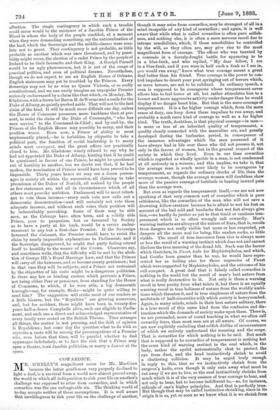THE PRINCES.
IN almost every Monarchy the position of the members of the Royal Family is one of the difficulties of statesmen, and we should not wonder if it became one even in England. Princesses, indeed—unless they fall in love unwisely, an event which, though it has occurred both in France and Austria, witness the cases of the Duchess de Berry, and of Napoleon's widow, the Grand Duchess of Parma, happens wonderfully seldom—are rarely troublesome. Either they marry more or less acceptably, and go away, or they live at home as quiet daughters of the house, or they vegetate apart from the current of affairs in dignified retirement. They cannot form political parties, they very rarely lead society, and they have not often been so popular as to be individually formidable. In modern history, two Princesses, our own Mary Stuart, and the German lady who became Catherine II. of Russia, have headed successful rebellions, the Duchess de Berry was Louis Philippe's most dangerous foe, and the Princess of the Asturias was for a short time supposed to govern Spain ; but as a rule, the lives of Royal ladies have interested courtly biographers, rather than serious historians. Princes, however, are often troubles. It is, we suppose, impossible to base a system upon pedigree without conferring some kind of importance upon all who can claim that pedigree as their own; and in all States the rivalries, ambitions, popularities, or unpopularities of Princes have fretted or perplexed statesmen. Either the Princes have been employed by the Sovereign, which is the more usual policy, and then their disasters have reflected disgrace upon the dynasty in a special manner, and have cost it popularity with the Army; or they have been shunted out of politics, and then they have been discontented subjects, formidable from their rank. Some families, such as the Hapsburgs, have been nearly exempt from this danger, which is scarcely noticed in Vehse's pages ; but it has been a great one for the Bourbons, it was felt by English Tudors, Stuarts, and the House of Brunswick, and it has not been entirely absent from the history of the Romanoffs. Even in very recent years the Russian Grand Dukes have headed parties in a dangerous way, and the son of Alexander I., the Grand Duke Constantine, never reconciled himself perfectly to his brother's elevation. The late Emperor was repeatedly called upon to " regulate " family difficulties, and in the gossip of Russia, at all events, they press heavily on the present Czar. Even in England, where all such cabals are supposed to be hopelessly out of date and forgotten, history has been compelled, and that very recently, to take note of them. Not to speak of the Tudors, whose reigns were one long war against possible rivals resting their claims on pedigree, and of the Stuarts, who were three times supplanted by cadets—Mary and Anne both reigning because they were Stuart Princesses, and the Electress Sophia being selected by Parliament for the same reason—there was that still obscure affair of the old Duke of Cumberland in 1835. Thousands believed that he aspired to the Throne—aspired, we mean, by active intrigue—and Joseph Hume, a keen observer with exceptional means of information, attacked him in his place in Parliament. It is difficult to believe that the Duke could have so deluded himself, but he had an energetic Orange following, party spirit ran very high, and he may have hoped for a Parliamentary vote. He had a much better position than Monmouth, and it seems incontestable that Monmouth thought the people of England would declare for him, and against the legitimate line. He was not wrong in thinking that a " usurpation " was possible.
The rise of a cadet branch in this country with a distinct political or social position justifying a pretence to the Crown seems quite impossible now, and, we presume, it really is so. A soldier Prince might save the country from an invasion, and so establish a claim ; but, apart from the improbability of the event, the English people would be shocked by his asking for that particular reward. They would give him anything else, in money, or honours, or even office; but, from a change of feeling which has been little observed, but which, we think, has certainly occurred, they would think him as unreasonable in aspiring to the Throne as they would have thought the Duke of Wellington. Napoleon believed the Iron Duke would never remain a subject, and could not imagine that if ten days after Waterloo he had ordered a regiment to march on the House of Commons, his officers would have laughed in his face, and the people would have considered him a lunatic. No Prince in a country like this could show himself a Bismarck or a, statesman of the first order in other ways ; and if he did, though he might conceivably be beyond dismissal, he could never get the vote of Parliament, withou,t which he would be powerless as an aspirant to the Throne. Even in extreme circumstances, with the Empire visibly falling, the claim to that one prize would destroy the public confidence and the popular affection. The single contingency in which such a trouble could occur would be the existence of a Jacobin Prince of the Blood in whom the body of the people confided, at a moment when they were demanding something, say the nationalisation of the land, which the Sovereign and the middle-c]asses were resolute not to grant. That contingency is not probable, as little probable as another which was once threatened, and by possibility might occur, the election of a cadet Prince by the people of Ireland to be their favourite and their King. A Guelph Parnell would be an ugly phenomenon, but it is out of the range of practical politics, and even of political dreams. Nevertheless, though we do not expect to see an English House of Orleans, English statesmen may yet be troubled by the Princes. Every Sovereign may not be as wise as Queen Victoria, or as coolly constitutional, and we can easily imagine an unpopular Premier seriously embarrassed by a claim like that which, on Monday, Mr. Gladstone, with a frown for Baron H. de Worms and a smile for the Duke of Albany, so quietly pushed aside. That will not be the last claim of the kind. It will be much more difficult one day, unless the House of Commons possesses more backbone than at present, to resist the claim of the Duke of Connaught, "who has seen service," to the Command-in-Chief; and by-and-by, the Princes of the English House may possibly be many, and their position worse. Even now, a Prince of ability is most unpleasantly placed,—he is forbidden by etiquette to take a political part, the function of social leadership is to many minds most ennuyant, and the great offices are practically closed to him. Mr. Gladstone wisely refused to say why he had not appointed the Duke of Albany, hinting that if he could be questioned in favour of one Prince, he might be questioned out of hostility to another, but we doubt not that, if he had spoken, the nomination of Princes would have been proved to be impossible. Thirty years hence we may see a dozen personages in society all within the succession, all claiming to take precedence of the Dukes of Norfolk, all noticed by the people as few statesmen are, and all in circumstances which of all others most provoke ambition. Parliament will be most reluctant to vote them incomes—every such vote now calls out a democratic demonstration—and will certainly not vote them adequate incomes, and without such votes their position will be indescribably provoking. Some of them may be able men, as the Coburgs have often been, and a solidly able Prince, poor to pauperism, but so favoured by Society as to have a party at his back, would be a severe embarrassment to any but a first-class Premier. If the Sovereign favoured the claimant, the Premier would have to resist the claim by nearly impossible explanations to Parliament; and if the Sovereign disapproved, he might find party feeling extend itself to hostility to the wearer of the Crown. Observers say, and sometimes write, that the difficulty will be met by the abolition of George III.'s Royal Marriage Law, and that the Princes will carry off the heiresses, and so become county gentlemen ; but in that case they will be subjects, and a Prince not restrained by the etiquettes of his caste might be a dangerous politician. Is there any law or binding custom which prevents a Prince, not being either Peer or pensioner, from standing for the House of Commons, to which, if he were able, a big democratic borough—say, for example, Stoke—might be quite willing to send him The suggestion will strike most of our readers as a little bizarre, but the "Royalties" are growing numerous, and, but for accident, there might have been in twenty-five years half-a-dozen Campbells alive, each one eligible to Parliament, and each one a direct and acknowledged representative.of every family ever seated on the British Throne. Time arranges all things, the matter is not pressing, and the drift of opinion is Republican ; but some day the question what to do with so separate a caste will be among the preoccupations of a Premier who, even before that time, will be puzzled whether to find appanages indefinitely, or to face the risk that a Prince may open a theatre, turn Jacobin politician, or marry a dancer at the opera.



































 Previous page
Previous page